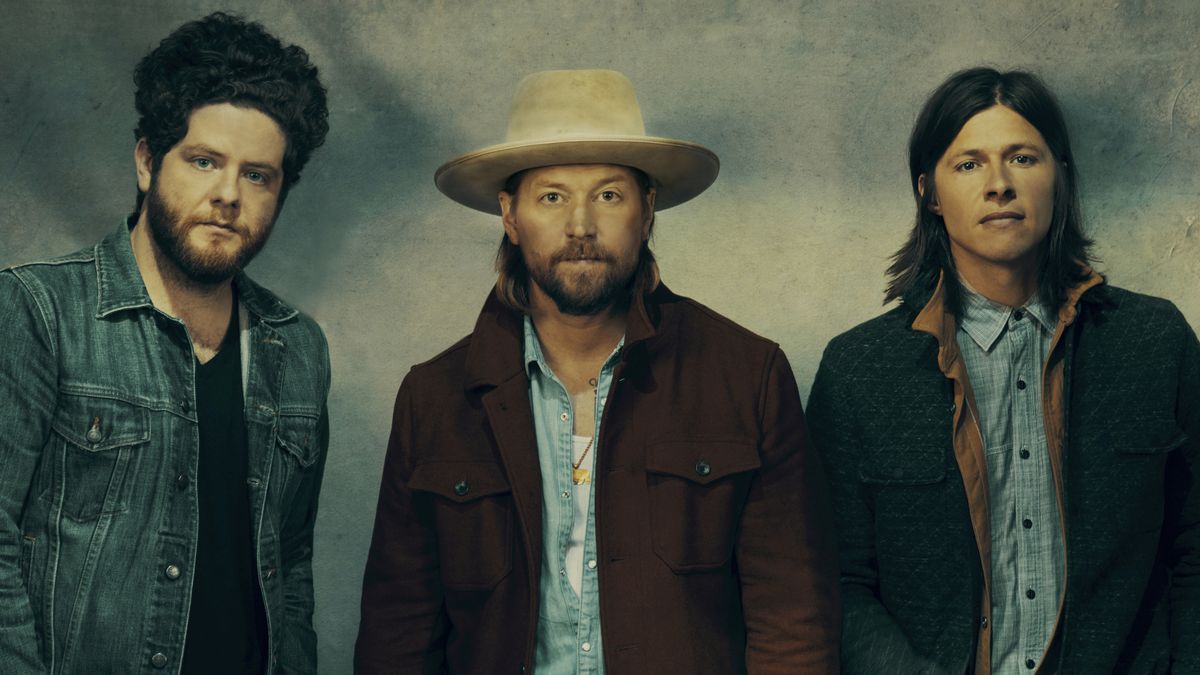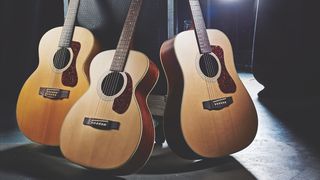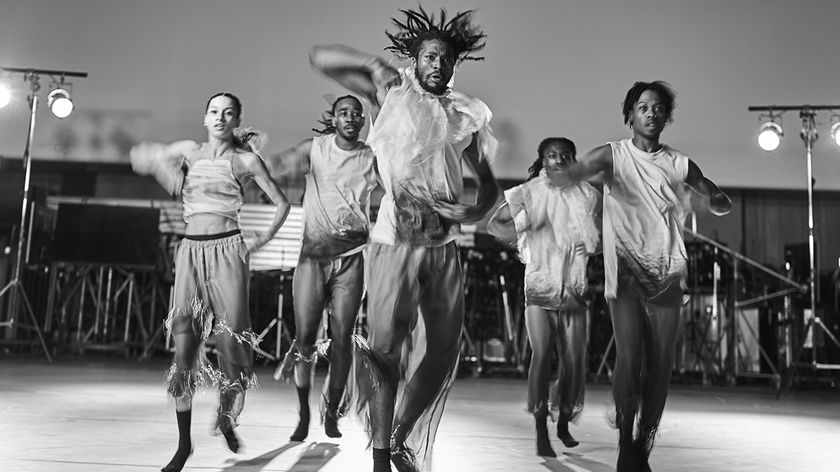Needtobreathe's Bear Rinehart: 12 albums that changed my life
The South Carolina band's frontman on a diverse range of influences – from Beck, Springsteen and Arcade Fire to Black Crowes and Fiona Apple

Earlier this year, Needtobreathe announced that they would be releasing their seventh album, Out of Body, but unlike the six albums that came before it there would be one crucial difference. Out of Body (scheduled for release late August) will be the first of the band's records without founder (and brother of frontman Bear), Bo Rinehart, who left the band in April 2020.
"I think for sure there was a question." Bear tells us when we ask about whether the guitarist's departure might have put an end to the band. "And it really wasn't just up to me, I think all the guys were dealing with it in different ways. And I don't know if we really thought that we wouldn't continue, but I think the timing of the record and whether we were ready to go back in was certainly up in the air for a while. But yeah, for sure there were doubts about what we should do."
"It was weird, different, you know? We kind of knew he'd been thinking about leaving for a couple of years. So I think our feelings weren't as emotional as maybe the fans were when we announced it, but we went in, honestly, to make a record without him for the first time from note one.
"In a lot of ways, the music is kind of what fixed a lot of the things for us"
"He wrote on some songs, for sure. And I think he was kind of like a ghost in the room a little bit. We were always like, 'Will Bo like this or not?!' But the first couple of weeks we were in the studio, we were pretty humble about what it was going to look like, and not exactly sure kind of where all the pieces would fit. It wasn't until, probably halfway-in that we started to feel like, Okay, this is different, but this is cool and we like it and feel feel good about it.
"In a lot of ways, the music is kind of what fixed a lot of the things for us, and the sense of we got into the studio and felt great and kind of felt like we were making a really good record and it kind of solidified the three of us in a lot of ways."
The album was recorded in Nashville, the city Bear, a South Carolina native, now calls home, and it seems that immersing himself in Music City has given him a creative push.
"I moved here a couple years ago and it's been cool to kind of get into the scene and get know the people that you work with," he explains. "It's an incredibly soulful town and it's obviously not just country anymore. There's so many rock and roll and pop guys.
Get the MusicRadar Newsletter
Want all the hottest music and gear news, reviews, deals, features and more, direct to your inbox? Sign up here.
"It's crazy to think that if you need a horn player who's played on a Johnny Cash record or whatever, you can call them! So for me it's been a different experience and really inspiring. Since I moved here, I've been the most creative I've ever been."
"I'm almost like the Pat Smear of Needtobreathe in a way!"
When it came to recording the album, Needtobreathe took a different approach, shunning the modern desire for endless takes and perfection, and instead opting for a more live, organic band performance.
"We did sort of a live take thing – we always do some sort of hybrid of that, but this time was more played it all live in a room. I sang the vocals live. I think there was only a couple of songs that we actually comped the vocal from a take that wasn't live."
"We had an acoustic setup as well with couches and all these mics up all the time," reveals Bear, "and a grand piano. So some of the acoustic tracks, we really just sat on the couches and they just moved the mics to us.
"I do a lot on Martin guitars. They make one that kind of looks like a Gibson, it's a CEO-8. And kind of looks like a J200 sort of thing. I also have a '63 Gibson acoustic that I've had since the first record. It's kind of my baby. It's what I write on at home."
"I do all the nasty stuff [electric] stuff on the record," adds Bear. "I'm not that good at guitar, I can play one note really well for a long time! I've always been a fan of those types of players, I'm almost like the Pat Smear of Needtobreathe in a way!
"I think I think a lot of the stuff I did was like that. So just we had an old studio with a bunch of old amps and stuff and we'd kind of move through them.
"We did a lot of room miking on guitar amps, which is was a little bit different for us, but I thought it came out great. A lot of 12-string stuff. Nash is a guy that made these Teles, and he made me a 12-string electric that we used on this record a lot. We do a lot of open tunings, banjos and mandolas…probably too many toys, honestly!"
So with an album made in one of the most musically diverse cities in the US, we sat down with Bear to find out exactly what inspirational ingredients go into the songwriting pot for a Needtobreathe album.
1. Black Crows - The Southern Harmony and Musical Companion (1992)
"The first big record that changed everything for me was Black Crowes - Southern Harmony and Musical Companion. I grew up in church, so the gospel sort of soul thing and rock mixed together really got me going. A lot of the choir background parts.
"I would probably say that's what got me onto electric guitar. First time I saw that band, I was kind of acoustic up until then."
2. Tom Petty - Wildflowers (1994)
"I think it challenged us a lot to figure out what we were doing in the studio"
"To me, still, to this day, this is the best sounding record there is. It was a record for me that just sounds like a greatest hits thing when you put the first four or five songs on. But also the way it's recorded so purely; it's a very grown-up, old man record. I think it challenged us a lot to figure out what we were doing in the studio.
"I think they got a lot more impact for a lot less things. I think when you're young, you put a bunch of stuff in the mix. Whereas with [Tom Petty], especially that record, you can really hear where the guitar is.
"We actually ended up working with the engineer who did did that record, Jim Scott. And I remember saying to him, 'I want my guitar to sound like that'. He's like, 'Well, get the Heartbreakers in here and you do it! But I basically put a [SM] 57 on an amp.
"So it just challenged us in the sense of, it's really about the playing and the performance, not necessarily the gear or how many tracks you can use. That pushed us really hard to get better in the studio."
3. Pete Yorn - musicforthemorningafter (2001)
"This is kind of the opposite of [Wildflowers]. This was a college record for me. I was kind of in a rock and roll phase, but the writing on that record really got me into like this dreamy sort of songwriting thing. It was beautiful.
"I probably listen to that record more in a passive way than I've ever listened to anything. I mean, I just remember it being in the car for two or three years when I was in college.
"I think there's something to that. I just started playing guitar a few years before that and most of the stuff that was on there, I could have played. There's an element to that. It's not really about how complicated it is. It's where it's placed."
4. Beck – Odelay (1996)
"I just had to pick a record from him! There was a show that we used to watch called Sessions At West 34th that was on public television. I remember seeing a performance of Where It's At or something.
"The way he danced and the way they were mixing so many styles - I was really up on folk and blues, maybe not as much as the hip-hop or sampling of records and all that.
"I'd grown up around it, but I didn't know much about it. And it was the first artist to me that like, was slamming styles together that had no business being together. And I loved it, especially as a kid."
5. Bruce Springsteen - Nebraska (1982)
"It's kind of hard not to list this record for somebody who's a songwriter. It's a little obvious, but to me the brilliance is the simplicity of it.
"I think it's really easy - especially as the time when I was hearing it was when Pro-Tools was first coming out - there are a lot of ways that recording gets in the way of good songs.
"So I started trying to write songs on a four track like that, pretty much the guitar and vocal and then I'd add some stuff on top, but you couldn't go in there and edit it and all that.
"I know that Jack White always talks about forced-limitations but there's something to that"
There was something really powerful about that and obviously, you know, Atlantic City is probably one of my favourite songs of all time - lyrically, the sort of multi level thing. I couldn't relate to the story itself, but the feeling.
"I know that Jack White always talks about forced-limitations but there's something to that, you know. I noticed when I write songs on the road in the same way - I'll be in a voice memo or something - it's like it'll never be better than that voice memo sometimes. That was the moment I wrote it and I could only perform with that one microphone. There's nothing else to think about. There's something really beautiful about that."
6. Fiona Apple - Extraordinary Machine (2005)
"That was a that was a really interesting thing. I'm not a muso, or whatever you want to call it, like an art school music guy. I grew up playing chords on guitars and writing songs more than I did covering other people or having a lot of lessons and stuff.
"John Brion worked on that record and did a lot of crazy string arrangement things and also use of instruments that now maybe you hear [more] in pop music because Logic has the fake ones on the programme. But the fact that they were really putting that together in a Sgt. Pepper's sort of way and just the musicality was crazy to me.
"Her sort of disregard for song structure and all of that is still something that when I listen back to it I'm always amazed. I don't know if I'd want to make music like that where people think of you as otherworldly, but I've always had that thing in my mind with her where it's kind of like 'Man, she is in space somewhere creating this stuff'. And I just love that, I'm so envious of it."
7. Jump, Little Children - Magazine (1998)
"Jump, Little Children is a little band from South Carolina where we grew up. They did sign to Atlantic at some point, but they were a really strange band – they had a stand up bass and they played these little four-string guitars.
"They did like rap-y, kind of talking pieces in the show. It was the first band I ever went and watched, and I was like, 'I think we can do this'. They played our local clubs, like 500 people or something.
"They were really all great musicians and now they've gone on to do a lot of cool things with orchestration and things like that. But, just the the sort of rock band vibe that was really inspiring to me. And that record and in particular has a song on there called Cathedrals that's one of the most beautiful songs I've ever heard.
"They were they were a huge band to us. I remember when we first sold out the same rooms that they were playing we thought we pretty much made it as it."
8. Lucinda Williams - Car Wheels On A Gravel Road (1998)
""There wasn't a lot of tricks to it, but the way it was played, I think something that we talked about a lot is the way guitar players add to a mix as opposed to, 'That guitar player is really good by themselves.'"
"We're from the South. So I liked Southern music, but I never really got huge into country music, maybe old school country in some ways. But the sort of rockabilly, angsty stuff really got me going, because it was kind of like something I might have seen growing up on a Friday night at some bar or something. It had this sort of rock attitude.
"I think if Lucinda Williams was in a punk band, it would be like, totally normal. She's got that sort of like screamy thing, and I think she backs that up. But [I'll chose] that record as it has a few songs that I've covered.
"We would go back and listen to those records - the way the guitars were recorded and the attitude. It's another record that doesn't have a lot on it, you know, just a couple of guitar players, bass and drums, and her voice.
"There wasn't a lot of tricks to it, but the way it was played, I think something that we talked about a lot is the way guitar players add to a mix as opposed to 'That guitar player is really good by themselves.'
"Sometimes you get in the room with a guitar player like that, and they they make no difference, if that makes sense. It's like they're fitting in so good. It's like they did nothing.
T"o me, there was something about the way she sang and her band played, that just made you pay attention. And I think that's something that we've always felt like we took away - you have to make an audience deal with you. The worst thing that could happen is they leave and be like, 'That was okay'. We either want them to hate us or they love it."
9. Fountains of Wayne - Welcome Interstate Managers (2003)
"That was a period of time in the band where we were in a van. And I remember we would have maybe two or three records, and then two or three VHS tapes we could watch.
"So at this time, it was like, [2003 music mockumentary] A Mighty Wind, I think was what we were watching, and then Fountains Of Wayne. The songs were so incredibly well crafted. And I think it taught us a lot about that. Not necessarily the subject matter, but how clear the storyline was in the songs.
"They were fun and and I think it really challenged us, coming from the Southern thing where it's almost cooler to not say too much – the way the storyline stuff was wasn't in classic singer songwriter way.
"I'm a big fan of Squeeze, and I feel like there's like a line of bands that had always done that, but I didn't grow up on that kind of stuff. So I think this was unlocking that to me."
10. Weezer - Weezer (The Blue Album) (1994)

"I go back to that stuff and it's so clever, but one of the things that really turned me on to that record was, that was MTV time for me. I was probably 15 or so when that came out.
"There was this attitude that certainly resonated with me in high school of, I don't care about all this pomp and circumstance. Some ways it was alternative and not even in a heavy way. Nirvana and all that stuff is so rock, and bashing the drums everything, whereas this was very nonchalantly punk.
I loved that about it, and still when I go back and listen to that record, it just stands up. You can listen all the way through and be blown away by the songs, a guitar riff. I love all the cheeky harmonic harmonies they have."
11. Arcade Fire - Neon Bible (2007)
"It just felt very visceral to me. It still does"
"I would say probably the thing that our band has taken the most from is that record. It was intentionally recorded in a church and had this sort of reverence to it. I remember pump organs were all the rage at the time!
"But I think that it was something about the roominess of that, the way it made you feel and the sort of rule-breaking harmony stuff. It just felt very visceral to me. It still does. I've always liked Arcade Fire, but that record in particular, the songwriting is just really, really great to me.
"Lyrically, I could follow it really well. And I think some of those lines like 'Who's gonna reset the bone?' and all these really strong – almost (I joke), but kind of like Meatloaf or something – very theatrical moments. I loved how they did it. You know, and I think we've always always kind of done that too.
"Trying to write inspiring music, uplifting in a way and I think I always think that I'm like that as I'm singing it with a fist in the air. It's like it's the antithesis to me of Stevie Wonder. You know, everything is so smooth and nice, and we're just yelling in this mic to make a statement. We do a lot of that. We love that."
12. Jim James - Regions Of Light And Sound Of God (2013)
"Really with this record, it changed my life because I listened to it a tonne when it came out, but also before I did a solo project last year, and it really just affected the way I sang.
"I always liked My Morning Jacket, but but hearing what he was doing vocally on the solo record, how he would throw the reverbs so much. A lot of how he would do that is by shortening how long he's singing the words, like a staccato kind of singing. And I think that from that record, I would say my vocal styling changed a lot.
"I've heard Keith Richards say that when he was in the studio and he got a block, he would take out the open G guitar. For me, it's always like, well, I just sing this verse like I'm Jim James. It just kind of gets me out of Whatever it is that I do. And so I'm a big fan of that."
Out of Body is released on 28 August via Atlantic Records. For more info visit Needtobreathe.com

I'm a freelance member of the MusicRadar team, specialising in drum news, interviews and reviews. I formerly edited Rhythm and Total Guitar here in the UK and have been playing drums for more than 25 years (my arms are very tired). When I'm not working on the site, I can be found on my electronic kit at home, or gigging and depping in function bands and the odd original project.

"Reggae is more freeform than the blues. But more important, reggae is for everyone": Bob Marley and the Wailers' Catch a Fire, track-by-track

“Part of a beautiful American tradition”: A music theory expert explains the country roots of Beyoncé’s Texas Hold ‘Em, and why it also owes a debt to the blues











